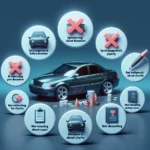
Donating your car to charity can be a powerful way to give back to your community, support causes you care about, and even benefit from tax deductions.
In this comprehensive guide, we will explore the 5 trends shaping the future of car donations for charitable individuals. From the rise of online platforms to the increasing focus on environmental sustainability, these trends are transforming how we contribute to charitable causes through vehicle donations.
Understanding the Evolution of Car Donations for Charitable Individuals
The landscape of car donations has evolved significantly over the past few decades. Initially, car donations were a straightforward process where individuals would donate their old vehicles to local charities. However, with the advent of technology and changing societal values, the process has become more sophisticated and impactful.
One of the key changes in the evolution of car donations is the increased awareness and regulation surrounding the practice. In the early 2000s, there were numerous cases of fraud and misuse of donated vehicles, which led to stricter regulations and oversight. Today, donors are more informed and cautious, ensuring their contributions are used effectively.
Another significant change is the rise of specialized car donation programs. Organizations like Habitat for Humanity and Goodwill have developed dedicated programs to handle vehicle donations, making the process more efficient and transparent. These programs often provide detailed information on how the donated vehicles are used, giving donors peace of mind.
Lastly, the evolution of car donations has been influenced by the growing emphasis on environmental sustainability. Many charities now focus on recycling and repurposing donated vehicles, reducing waste and promoting eco-friendly practices. This shift aligns with the broader societal trend towards sustainability and responsible consumption.
Exploring the Top 5 Trends Influencing the Future of Vehicle Contributions
The Rise of Online Car Donation Platforms
One of the most significant trends shaping the future of car donations is the rise of online platforms. These platforms have revolutionized the way individuals donate their vehicles, making the process more accessible and convenient. Websites like DonateACar.com and CarDonationWizard.com allow donors to complete the entire donation process online, from selecting a charity to scheduling a pickup.
Online platforms also provide greater transparency and accountability. Donors can easily research charities, read reviews, and track the impact of their donations. This level of transparency helps build trust and encourages more individuals to participate in car donation programs.
Moreover, online platforms often offer additional resources and support, such as tax deduction calculators and donation guides. These tools help donors understand the financial benefits of their contributions and ensure they comply with IRS regulations.
Environmental Sustainability in Car Donations
Environmental sustainability is another major trend influencing the future of car donations. As awareness of climate change and environmental issues grows, more individuals are seeking ways to reduce their carbon footprint and support eco-friendly initiatives. Donating a car to charity can contribute to this goal in several ways.
Firstly, many charities now focus on recycling and repurposing donated vehicles. Instead of sending old cars to landfills, these organizations dismantle them for parts, recycle the metal, and refurbish usable components. This process reduces waste and conserves valuable resources.
Secondly, some charities use donated vehicles to support environmental programs. For example, a charity might use a donated truck to transport supplies for a reforestation project or a donated van to conduct environmental education programs. By supporting these initiatives, donors can make a direct impact on environmental conservation.
Lastly, donating a car can help reduce emissions. Older vehicles often have higher emissions and lower fuel efficiency compared to newer models. By donating an old car and potentially replacing it with a more fuel-efficient vehicle, donors can contribute to reducing overall emissions and promoting cleaner air.
Transparency and Accountability in Charitable Organizations
Transparency and accountability are crucial factors in the success of car donation programs. Donors want to ensure that their contributions are used effectively and that the charities they support are trustworthy. This trend has led to increased scrutiny and regulation of charitable organizations.
Many charities now provide detailed reports on how donated vehicles are used and the impact of these contributions. These reports often include information on the number of vehicles donated, the funds raised, and the specific programs supported. By providing this level of transparency, charities can build trust and encourage more individuals to donate.
Additionally, third-party organizations like Charity Navigator and GuideStar evaluate and rate charities based on their financial health, accountability, and transparency. These ratings help donors make informed decisions and choose reputable organizations to support.
 Benefits of Car Donations for Budget-Conscious Individuals
Benefits of Car Donations for Budget-Conscious IndividualsCharities are also adopting best practices in governance and financial management to ensure accountability. This includes regular audits, clear financial reporting, and adherence to ethical standards. By maintaining high standards of transparency and accountability, charities can attract more donors and maximize the impact of their programs.
Leveraging Tax Benefits through Car Donations
One of the primary incentives for donating a car to charity is the potential tax deduction. The IRS allows donors to deduct the fair market value of their donated vehicle, provided certain conditions are met. Understanding these tax benefits and how to leverage them is a key trend shaping the future of car donations.
To qualify for a tax deduction, the charity must be a registered 501(c)(3) organization. Donors should obtain a written acknowledgment from the charity, detailing the donation and its intended use. If the vehicle is sold by the charity, the deduction is limited to the sale price. However, if the charity uses the vehicle for its programs, donors can deduct the fair market value.
It's important for donors to keep detailed records of their donations, including receipts, acknowledgment letters, and any correspondence with the charity. This documentation is essential for claiming the deduction and complying with IRS regulations.
Additionally, donors should be aware of the specific rules and limits for car donation deductions. For example, if the vehicle's value exceeds $500, donors must complete IRS Form 8283 and attach it to their tax return. Consulting with a tax professional can help donors navigate these requirements and maximize their tax benefits.
Community Impact of Vehicle Contributions
The impact of car donations extends beyond the individual donor and the receiving charity. These contributions can have a profound effect on communities and the people they serve. Understanding this broader impact is a key trend shaping the future of car donations.
Donated vehicles can support a wide range of community programs, from providing transportation for low-income families to supporting disaster relief efforts. For example, a donated van might be used to deliver meals to homebound seniors, or a donated truck might transport supplies for a community garden project.
In addition to direct support, car donations can help charities raise funds for their programs. By selling donated vehicles, charities can generate revenue to support their initiatives, such as education, healthcare, and housing. This financial support can make a significant difference in the lives of individuals and families in need.
Moreover, car donations can foster a sense of community and social responsibility. By donating a vehicle, individuals can contribute to the well-being of their community and inspire others to do the same. This collective effort can create a positive ripple effect, leading to stronger, more resilient communities.
Benefits of Donating Your Car to Charity: Tax Deductions and More
Donating a car to charity offers numerous benefits, both for the donor and the receiving organization. Understanding these benefits can help individuals make informed decisions and maximize the impact of their contributions.
Tax Deductions
One of the most significant benefits of donating a car to charity is the potential tax deduction. As mentioned earlier, the IRS allows donors to deduct the fair market value of their donated vehicle, provided certain conditions are met. This deduction can reduce the donor's taxable income and lower their overall tax liability.
To qualify for a tax deduction, the charity must be a registered 501(c)(3) organization, and the donor must obtain a written acknowledgment of the donation. The deduction amount depends on how the charity uses the vehicle. If the vehicle is sold, the deduction is limited to the sale price. If the charity uses the vehicle for its programs, the donor can deduct the fair market value.
It's important for donors to keep detailed records of their donations and consult with a tax professional to ensure they comply with IRS regulations and maximize their tax benefits.
Convenience and Hassle-Free Process
Donating a car to charity can be a convenient and hassle-free process. Many charities offer free towing and pickup services, making it easy for donors to contribute their vehicles. Online platforms and dedicated car donation programs streamline the process, allowing donors to complete the entire transaction from the comfort of their homes.
This convenience is especially beneficial for individuals who have old or non-functional vehicles that are difficult to sell. Instead of dealing with the hassle of selling the car, donors can simply arrange for a pickup and support a charitable cause.
 Car Donation Insights for Socially Conscious Consumers
Car Donation Insights for Socially Conscious ConsumersEnvironmental Benefits
Donating a car to charity can also have positive environmental benefits. Many charities focus on recycling and repurposing donated vehicles, reducing waste and conserving resources. By donating a car, individuals can contribute to environmental sustainability and support eco-friendly initiatives.
Additionally, donating an old car and potentially replacing it with a more fuel-efficient vehicle can help reduce emissions and promote cleaner air. This environmental impact aligns with the broader societal trend towards sustainability and responsible consumption.
Supporting Causes Aligned with Your Values
Donating a car to charity allows individuals to support causes that align with their values and make a positive impact on their communities. Whether it's providing transportation for low-income families, supporting disaster relief efforts, or funding education and healthcare programs, car donations can make a significant difference in the lives of those in need.
By choosing a reputable charity and understanding how the donated vehicle will be used, donors can ensure their contributions have a meaningful and lasting impact.

Finding the Right Charity: Tips for Choosing a Reputable Organization
Choosing the right charity is a crucial step in the car donation process. With numerous organizations soliciting vehicle donations, it's important for donors to do their research and select a reputable charity that aligns with their values and goals.
Research and Reviews
One of the first steps in finding the right charity is conducting thorough research. Donors should look for charities that are registered 501(c)(3) organizations and have a proven track record of using donations effectively. Websites like Charity Navigator and GuideStar provide ratings and reviews of charitable organizations, helping donors make informed decisions.
Reading reviews and testimonials from other donors can also provide valuable insights into the charity's reputation and impact. Donors should look for organizations that are transparent about their programs and finances and have a strong commitment to accountability.
Understanding the Charity's Mission and Programs
It's important for donors to understand the mission and programs of the charity they choose to support. Donors should look for organizations that align with their values and have a clear and compelling mission. Understanding how the charity uses donated vehicles and the specific programs supported by these contributions can help donors make a meaningful impact.
For example, a donor who is passionate about education might choose a charity that uses donated vehicles to transport students or deliver educational materials. Similarly, a donor who cares about environmental conservation might choose a charity that focuses on recycling and repurposing donated vehicles.
Transparency and Accountability
Transparency and accountability are crucial factors in choosing a reputable charity. Donors should look for organizations that provide detailed information on how donations are used and the impact of their programs. This includes financial reports, program evaluations, and impact assessments.
Charities that adhere to best practices in governance and financial management are more likely to use donations effectively and ethically. Donors should look for organizations that conduct regular audits, provide clear financial reporting, and adhere to ethical standards.
Direct Communication with the Charity
Direct communication with the charity can also provide valuable insights and help donors make informed decisions. Donors should feel comfortable reaching out to the charity with any questions or concerns and expect prompt and transparent responses.
Speaking with representatives from the charity can provide a better understanding of the organization's mission, programs, and impact. This direct communication can also help build trust and ensure that the donor's contributions are used effectively.
Donating vs. Selling: Pros and Cons for Charitable Individuals
When deciding whether to donate a car to charity or sell it outright, individuals should consider the pros and cons of each option. Both choices have their advantages and disadvantages, and the best decision depends on the donor's goals and circumstances.
Pros of Donating a Car to Charity
- Tax Deductions Donating a car to a registered 501(c)(3) organization can provide a tax deduction, reducing the donor's taxable income and overall tax liability.
- Convenience Many charities offer free towing and pickup services, making the donation process easy and hassle-free.
- Environmental Benefits Donating a car can support recycling and repurposing efforts, reducing waste and promoting environmental sustainability.
- Supporting Causes Donating a car allows individuals to support charitable causes that align with their values and make a positive impact on their communities.
Cons of Donating a Car to Charity
- Potentially Lower Financial Return Donating a car may result in a lower financial return compared to selling it outright, especially if the vehicle is in good condition.
- Limited Tax Benefits The tax deduction for a donated vehicle is limited to the sale price if the charity sells the car, which may be lower than the fair market value.
- Research Required Finding a reputable charity and ensuring the donation is used effectively requires research and due diligence.
Pros of Selling a Car Outright
- Higher Financial Return Selling a car outright can provide a higher financial return, especially if the vehicle is in good condition and has a high market value.
- Immediate Cash Selling a car provides immediate cash, which can be used for other purposes or donated directly to a charity.
- Flexibility Selling a car allows individuals to choose how to use the proceeds, whether for personal use or charitable contributions.
Cons of Selling a Car Outright
- Time and Effort Selling a car requires time and effort, including advertising, negotiating with buyers, and completing the sale process.
- No Tax Deduction Selling a car does not provide a tax deduction, which may be a disadvantage for individuals seeking to reduce their taxable income.
- Environmental Impact Selling a car may not support recycling and repurposing efforts, potentially contributing to environmental waste.
Making an Impact: How Car Donations Support Communities and Causes
Car donations can have a profound impact on communities and the charitable organizations that serve them. Understanding this impact can help donors make informed decisions and maximize the benefits of their contributions.
 Top 5 Car Donation Mistakes to Avoid for Smart Budgeters
Top 5 Car Donation Mistakes to Avoid for Smart BudgetersSupporting Community Programs
Donated vehicles can support a wide range of community programs, from providing transportation for low-income families to supporting disaster relief efforts. For example, a donated van might be used to deliver meals to homebound seniors, or a donated truck might transport supplies for a community garden project.
By supporting these programs, car donations can make a significant difference in the lives of individuals and families in need. Donors can take pride in knowing that their contributions are helping to improve their communities and support those who need it most.
Generating Funds for Charitable Initiatives
In addition to direct support, car donations can help charities raise funds for their programs. By selling donated vehicles, charities can generate revenue to support their initiatives, such as education, healthcare, and housing. This financial support can make a significant difference in the lives of individuals and families in need.
For example, a charity might use the proceeds from a car donation to fund scholarships for students, provide medical care for underserved populations, or build affordable housing for low-income families. By generating funds through car donations, charities can expand their reach and impact.
Fostering a Sense of Community and Social Responsibility
Car donations can also foster a sense of community and social responsibility. By donating a vehicle, individuals can contribute to the well-being of their community and inspire others to do the same. This collective effort can create a positive ripple effect, leading to stronger, more resilient communities.
Moreover, car donations can raise awareness of important social issues and encourage others to get involved. By supporting charitable causes, donors can help create a culture of giving and social responsibility, promoting positive change in their communities.
Maximizing Your Contribution: Strategies for Effective Car Donations
To maximize the impact of their car donations, individuals should consider several strategies and best practices. These strategies can help ensure that donations are used effectively and provide the greatest benefit to the receiving charities and communities.
Choosing the Right Charity
Choosing the right charity is a crucial step in maximizing the impact of a car donation. Donors should conduct thorough research and select reputable organizations that align with their values and goals. Websites like Charity Navigator and GuideStar provide ratings and reviews of charitable organizations, helping donors make informed decisions.
Understanding the charity's mission and programs can also help donors ensure their contributions have a meaningful impact. Donors should look for organizations that provide detailed information on how donated vehicles are used and the specific programs supported by these contributions.
Understanding Tax Benefits and Compliance
Understanding the tax benefits and compliance requirements for car donations is essential for maximizing the financial impact of a contribution. Donors should ensure that the charity is a registered 501(c)(3) organization and obtain a written acknowledgment of the donation.
Keeping detailed records of the donation, including receipts, acknowledgment letters, and any correspondence with the charity, is crucial for claiming the tax deduction and complying with IRS regulations. Consulting with a tax professional can help donors navigate these requirements and maximize their tax benefits.
Ensuring Transparency and Accountability
Ensuring transparency and accountability in the donation process is important for maximizing the impact of a car donation. Donors should look for charities that provide detailed reports on how donations are used and the impact of their programs. This includes financial reports, program evaluations, and impact assessments.
Charities that adhere to best practices in governance and financial management are more likely to use donations effectively and ethically. Donors should look for organizations that conduct regular audits, provide clear financial reporting, and adhere to ethical standards.
Communicating with the Charity
Direct communication with the charity can provide valuable insights and help donors make informed decisions. Donors should feel comfortable reaching out to the charity with any questions or concerns and expect prompt and transparent responses.
Speaking with representatives from the charity can provide a better understanding of the organization's mission, programs, and impact. This direct communication can also help build trust and ensure that the donor's contributions are used effectively.
 Ultimate Guide to Car Donations for Charitable Individuals
Ultimate Guide to Car Donations for Charitable IndividualsFrequent questions
What are the tax benefits of donating a car to charity?
Donating a car to a registered 501(c)(3) organization can provide a tax deduction, reducing your taxable income and overall tax liability. The deduction amount depends on how the charity uses the vehicle. If the vehicle is sold, the deduction is limited to the sale price. If the charity uses the vehicle for its programs, you
Si quieres conocer otros artículos parecidos a 5 Future Car Donation Trends: A Charitable Guide for Individuals puedes visitar la categoría Car donation.
Leave a Reply
You must be logged in to post a comment.







Related posts